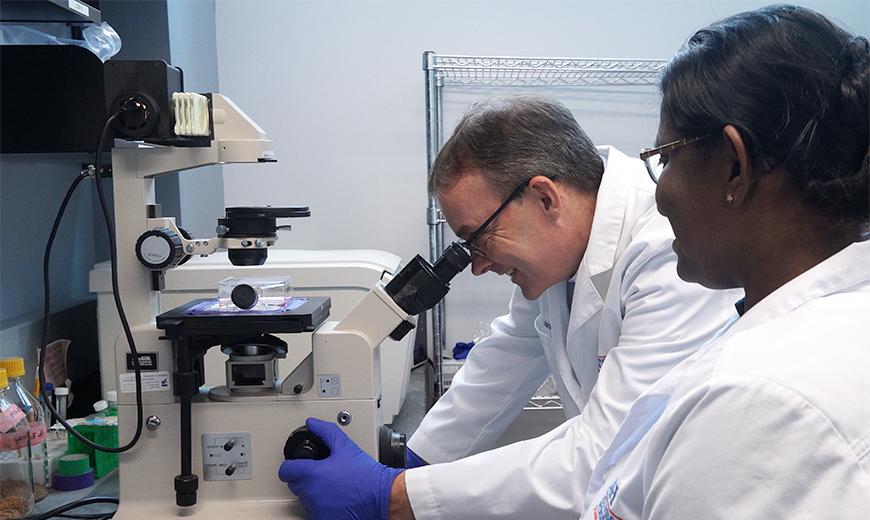3/20/2024
Science in Seconds: Meet Patrick Grant, Ph.D.
A Path to Uncover Better Treatments for Aggressive Childhood Cancer
Patrick Grant, Ph.D., professor, Charles E. Schmidt College of Medicine, wants to help children survive – children with a rare, deadly blood cancer that is resistant to treatment.
The number of cases of this cancer, called childhood acute lymphoblastic leukemia (ALL), has steadily increased by 0.7% annually since 1999, Grant said. And for 10% of those cases, the cancer is resistant to treatment, like chemotherapy. “The patients have very aggressive treatment resistant leukemias and the thing is, we don’t fully understand what drives that,” Grant said.
In ALL, 90% of patients survive past five years. But for 10%, they don’t survive five years and they are called very high-risk patients, he said. So, he’s using epigenetics research to uncover more about how resistance works, in an effort to increase the five-year survival rate for high-risk patients. For this work, he recently earned a grant from the Florida Department of Health Live Like Bella Pediatric Cancer Research Initiative.
While DNA of genes carry the genetic information of an individual, epigenetics is a process of regulating how those genes turn on and off. Behaviors and environment can cause changes and impact how genes work. For instance, consider identical twins. While they share the same DNA, their unique experiences in life will cause some genes and not others to express themselves. This is why identical twins may eventually look and behave differently.
Epigenetic mechanisms work by making chemical, or physical changes to the cells. In one case, it’s by changing the proteins in cells, specifically histone proteins. Histone proteins bind to DNA and contribute to genes being turned on and off, which has implications for cancer cells and how they multiply or develop resistance to chemotherapies.
“What we believe is happening in treatment resistant patients is that they have activation of some of these epigenetic pathways that allow the cancer to escape treatment,” Grant said. By understanding those pathways, Grant and other scientists could target them to restore that drug’s sensitivity in the cancer patient.
To examine those pathways, Grant and his research team begin by studying the chemical modification of histone proteins in cells and use genetically engineered histone proteins that can no longer be modified. Then, they test the cells for whether they’ve suddenly become sensitive to chemotherapies when they normally wouldn't, he said. “That points us towards pathways of this histone modification that mediate resistance, and then further investigate these pathways in leukemia cells from children with cancer.”
“We're missing something in our ability to help everybody and it’s critical to find new targets for therapy, particularly for high-risk patients,” Grant said. “And the highest risk patients are the ones who are resistant to treatment.”
If you would like more information, please contact us at dorcommunications@skyupiradio.com.

Patrick Grant, Ph.D.
Charles E. Schmidt College of Medicine
Watch video
